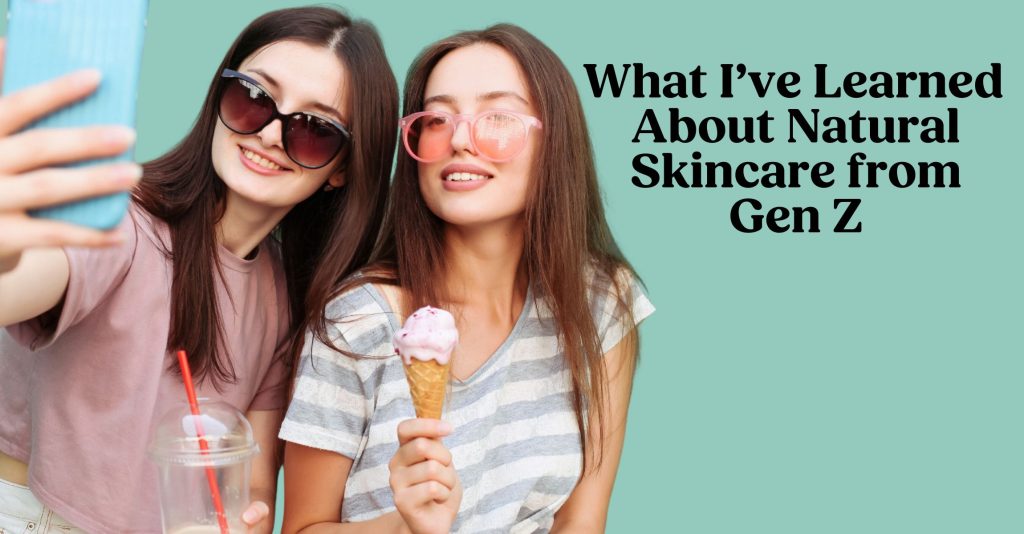
What I’ve Learned About Natural Skincare from Gen Z
Over the past few years, I’ve found myself learning so much from Gen Z—sometimes through casual conversations in the shop, other times by scrolling their blogs or catching their vlogs late at night. What strikes me most is their honesty. They’re not chasing flawless perfection or hiding behind layers of heavy foundation. Instead, they’re sharing stories about breakouts, sensitivity, and self-acceptance. They’re tired of trying to cover their skin and are (finally!) a generation that seems comfortable in their own skin—and I can’t help but admire that.
1. Better skin—and less makeup—go hand in hand
Skincare lays the foundation. When your skin is cared for and healthy, makeup becomes optional, rather than a must-have crutch.
Why this matters:
-
Cosmetic products—makeup and skincare alike—can carry hundreds of synthetic ingredients linked to adverse effects. One review found 88 chemicals across 73,000 products associated with headaches, irritations, allergies, cancer, and reproductive issues.
-
Another flagged heavy metals like lead, mercury, and nickel, and endocrine-disrupting chemicals (EDCs), which may interfere with hormone function and increase cancer risks.
-
A 2025 study exposed carcinogenic formaldehyde unnecessarily present in everyday makeup—raising serious questions about regulatory failures. The Times of India
-
Even PFAS—so-called “forever chemicals”—used to make products water-resistant are absorbed through the skin and increasingly linked to cancer and thyroid issues. theguardian.com
The message is simple: what you put on your skin matters! A good skincare routine minimizes exposure to toxic ingredients and reduces reliance on heavy cosmetic coverage.
2. The rising popularity of “less is more” makeup—especially among younger generations
Younger people are redefining beauty—with a nudge toward minimalism, authenticity, and ingredient awareness.
Gen Z’s shifting habits:
-
Only 6% of Gen Z uses makeup daily—the lowest rate among all age groups—while 22% wear it only occasionally, treating makeup as a statement, not a daily uniform.
-
They highly prioritize natural or organic ingredients (34%), skin-type suitability (44%), and sustainability (25%)—values that matter more than mere aesthetics.
-
CivicScience data shows daily/weekly makeup use among U.S. women has fallen 20% since 2019, with more women moving toward occasional or no makeup use.
Cultural mindset shifts:
-
Post-pandemic beauty culture embraced the “no makeup” or “clean girl” aesthetic, celebrating natural beauty, self-acceptance, and minimal product use. Authenticity—and skin-first beauty—are central to this.
-
Campaigns like “Get Un-Ready With Me” are encouraging young girls to go makeup-free, promoted by moms and influencers as a counter to glam culture and its mental health impact.
3. How focusing on skincare over makeup supports both safety and self-love
Why I love this movement—and why it aligns with the values behind Pure Anada, a clean make-up brand we love and stock:
-
It’s empowering, not masking. Wearing less makeup (or none at all) invites confidence, not cover-ups.
-
It’s mindful and ethical. Clean skincare—especially with safe, natural formulations—means fewer harsh ingredients and more care for skin and environment.
-
It aligns with consumer values. People today demand authenticity, transparency, and ingredient integrity. Pure Anada stands for all of that.
4. Your brand advantage: Pure Anada stands apart
Pure Anada is not just a product line, but someone we consider partner in this movement:
-
Safe, minimally formulated beauty that respects skin’s health—not overwhelms it.
-
Ingredient transparency—because “natural” isn’t regulated, but you define it with honesty.
-
Supports natural beauty, not hides it. Your products complement healthy skin rather than mask it.
5. Quick reference roundup of sources
| Theme | Key Findings |
|---|---|
| Toxic makeup ingredients | 88 chemicals tied to health risks in 73,000 products ; formaldehyde in everyday products ; PFAS absorbed via skin |
| Heavy metals & EDCs | Risks from lead, arsenic, parabens, etc. |
| Gen Z’s minimal makeup trend | 6% daily use, 22% occasionally; prioritizing natural ingredients & sustainability |
| Declining frequent wear | 20% drop in daily/weekly makeup use among U.S. women since 2019 |
| Authenticity movement | Embrace of “no makeup” aesthetic, self-love trends |
Bottom line
Better skin care isn’t just about glowing skin—it’s about reclaiming beauty on your terms. As the world shifts toward simplicity and integrity, Pure Anada stands ready, offering products that support natural beauty safely and honestly. I truly applaud Gen Z for leading us in this movement and hope you can get on board too! Love the skin you’re in!
xoxo
Jewels
